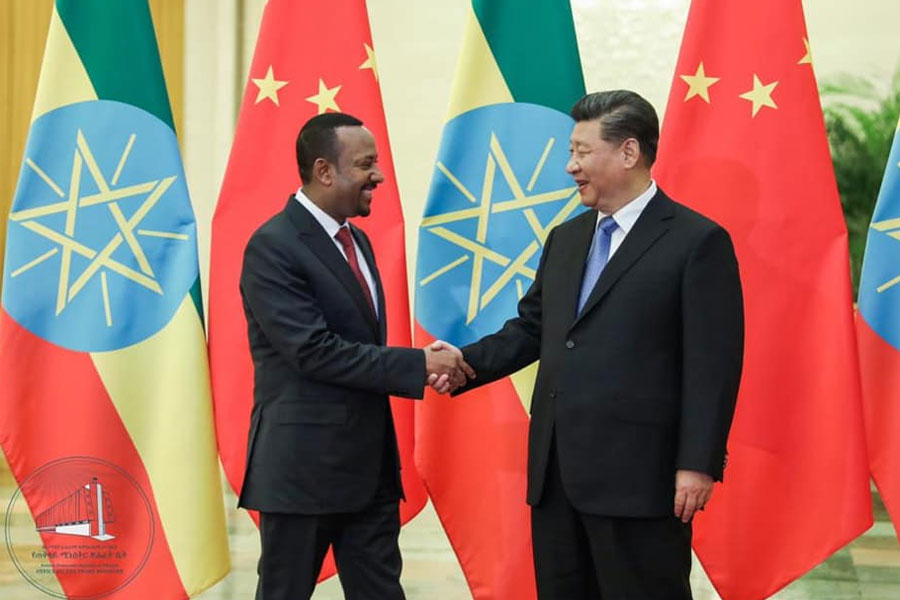
Featured | Apr 06,2024
Feb 13 , 2021
By Abu Girma Moges
Persistent inflation has been a bane to the health of Ethiopia's economy. It will not be addressed by anything less than adopting a prudent monetary policy and setting the environment of the political economy right, writes Abu Girma Moges (agmoges@gmail.com), professor of economics at the University of Tsukuba in Japan. He can be reached at agmoges@gmail.com.
Finding prices is the primary function of markets. By bringing the forces of demand and supply into action, a well-functioning competitive market system allows for a more realistic regime of relative prices in an economy. This is crucial because prices signal vital information to millions of decision makers about the price, thereby facilitating efficient allocation and timely adjustments in the economy.
Despite seemingly robust economic growth that the Ethiopian economy has registered for a decade and a half, the quality and composition of growth have been such that it left the economy highly unbalanced and trapped far below its full employment potential and labour productivity. Real incomes remain extremely low. As a result, the economy has failed to achieve sufficient structural transformation, and it has become increasingly dependent on and exposed to risks from excessive current account deficits.
The central problem of the economy has been failure to achieve robust and equitable economic growth that addresses unemployment of resources. During the past two decades, the population has been increasing on average by about 2.4 million people a year, while those reaching working age expanded at an annual pace of 1.6 million, the economy has barely kept up the pace. Such rapid growth of the labour force, properly utilised, could have been a potent power for economic development. However, failure to equip the younger generation with appropriate investment in skills and employment opportunities has deprived the economy of its potential.
However, sustainable and productive employment generation is mainly driven by private sector initiatives with the helping hand of the public sector. The latter, by setting a conducive investment environment and minimising distortions in incentive structures, could play a critical role in the process. However, the economic policy environment in Ethiopia remains unfriendly to private sector initiatives and investment.
Indeed, high unemployment and persistent double-digit inflation in Ethiopia, which breed misery and destitution, are partly attributable to distorted economic policy. This distortion, in turn, is directly derived from the “developmental state” chimera and its core coercive and extractive manifestations. It failed to allocate vital resources to productive investment initiatives away from economically unproductive sectors of the economy. Such a political economy setting focuses on syphoning off resources from the masses and channeling them into inefficient and corrupt, and yet politically appealing, activities. In the process, it also shaped the behavior of the privileged private sector players to sharpen their tactics to squeeze extraordinary profit from a highly protected market.
Among these challenges, giving a headache to both consumers as well as businesses is inflation. While much of the world has stabilised inflationary pressure in recent decades, inflation momentum has gained traction in Ethiopia. To illustrate the situation, just since 1999/2000, the average consumer price index (CPI) has grown more than nine fold. A more accurate measurement of inflation in the country that excludes items in the basket which are subject to price controls would have depicted an even more dire circumstance.
This rapid and persistent inflation has resulted in considerable erosion of the public's purchasing power, and only those whose income kept up with the rapid inflation were able to remain above water, whereas the majority lost the game. In the process, inflation has systematically redistributed the meagre wealth of the public favouring those that managed to access financial credit services. This unproductive and inefficient transfer of resources from depositors to creditors in the tightly controlled financial sector has as well given rise to corrupt and speculative behaviour. Such a practice not only extracts resources from the poor and channels it to those with privilege, it also perpetuates inefficiency in the entire economy.
Careful examination of Ethiopia's available economic and financial data suggests that inflation and its persistence are partly driven by excessive growth in broad money supply relative to the real growth of the economy. With fairly tenable assumptions about the monetary system settings, transmission mechanisms, the structural features of the economy, and experiences of other developing countries, money supply growth rate explains about half of the average price movement in Ethiopia.
The inflation problem in Ethiopia, however, has deeper and more complex institutional roots. Ethiopia's monetary policy has increasingly deviated from its central objective of price stability and gradually become a tool of activist and ill-advised policy experiments. As a result, the policy failed miserably either to achieve price stability or to promote full employment of resources in the economy.
While inflation has been fast and persistent, the cost of borrowing, as well as the exchange rate, were tightly controlled. This, in turn, created a significant incentive to borrow and use assets as inflation-proof as well as import from abroad at artificially cheap rates. The combination of rising general prices on the one hand and the relatively cheap cost of borrowing and importing shaped the incentive structure and gave rise to unique inflation expectation behaviour. The exchange rate regime needs separate consideration and yet it serves a similar purpose.
The rapid growth in money supply is the first order of cause behind inflationary momentum. Yet money supply expansion is also tied to unsustainable deficits in government, quasi-government and dominant private sector players. The willingness, or lack of restraining power, on the part of monetary authorities to monetise these deficits translate into expanding the monetary base. This is particularly the case where the debt market is underdeveloped, the overall asset market is distorted, and interest rates as well as the exchange rate deviate from their equilibrium levels.
To deal with such a challenging situation, it is critically important to manage the government's budget deficit, mitigate the unproductive spending behaviour of public enterprises, and pursue a realistic interest rate policy regime to prevent excessive pressure on monetary policy choices. Persistent negative real interest rates, despite its short-run benefits to borrowers who have access to highly restricted financial resources, ultimately results in a huge distortion in resource allocation in the economy and diverts away from productive investment opportunities.
The Ethiopian economy is still at an early stage of monetisation, and access to financial services is limited. With more monetisation, the role of effective monetary policy is bound to increase. Hence, it is imperative to set monetary policy that reflects the priorities and circumstances of the local economy and operate with a more transparent and accountable process. In this regard, it is prudent to develop robust monitoring and analysis capability at the central bank and design an integrated framework with a clear nominal anchor for conducting monetary policy that considers money supply, interest rates and the foreign exchange rate.
Monetary policymaking anchored on money supply alone, as experiences in other emerging economies reveal, risks facilitating the conditions for accelerated and persistent inflation. When negative real interest rates predominate, the system and a significant share of the public either do not have access to credit markets, hence the distortive and extractive momentum reinforces itself.
While flexibility in monetary policymaking is prudent, it is important to anchor policy on a sound theoretical framework, clear targets, and accountability to well-defined outcomes. To this effort, it is necessary to develop the central bank's institutional capacity to pursue prudent and effective monetary policy with operational autonomy and clear accountability. It also helps the core function and capacity of the central bank if members of the monetary policy board and management are as professional and apolitical as possible. This requires reforming the monetary policymaking institution so that prudent, evidence-based, credible and more effective monetary policy would be put in place and practised.
By now, the challenges of inflation and unemployment are widely recognised by the public. There is also a clear realisation that ineffective monetary policy and the overall political economy environment in which it operates are partly responsible for the problems. This calls for fundamental reform of the monetary policy regime and institutions with refocus on the objective of price stability.
There are recent initiatives by the government to reform the monetary policy of the country. But they are just tentative and fail to depart fundamentally from their core coercive and extractive nature. If the problems and cost of persistent inflation is to be addressed, it is time to undertake fundamental reform in monetary policy and institutions. After all, money is a social convention of trust and a means of exchange for mutually beneficial endeavours. A lack of prudent monetary policy could lead to prohibitively expensive and long lasting damage to the health of the Ethiopian economy.
PUBLISHED ON
Feb 13,2021 [ VOL
21 , NO
1085]


Featured | Apr 06,2024

Editorial | Jul 20,2024

Fortune News | Apr 26,2019

Agenda | Apr 22,2023

Fineline | Apr 04,2020

Radar | Aug 16,2020

Fortune News | Oct 27,2024

Covid-19 | May 31,2020

Fortune News | Jun 15,2019

My Opinion | Sep 21,2019

Photo Gallery | 178442 Views | May 06,2019

Photo Gallery | 168640 Views | Apr 26,2019

Photo Gallery | 159444 Views | Oct 06,2021

My Opinion | 137076 Views | Aug 14,2021
Commentaries | Oct 25,2025

Dec 22 , 2024 . By TIZITA SHEWAFERAW
Charged with transforming colossal state-owned enterprises into modern and competitiv...

Aug 18 , 2024 . By AKSAH ITALO
Although predictable Yonas Zerihun's job in the ride-hailing service is not immune to...

Jul 28 , 2024 . By TIZITA SHEWAFERAW
Unhabitual, perhaps too many, Samuel Gebreyohannes, 38, used to occasionally enjoy a couple of beers at breakfast. However, he recently swit...

Jul 13 , 2024 . By AKSAH ITALO
Investors who rely on tractors, trucks, and field vehicles for commuting, transporting commodities, and f...

Oct 25 , 2025
The regulatory machinery is on overdrive. In only two years, no fewer than 35 new pro...

Oct 18 , 2025
The political establishment, notably the ruling party and its top brass, has become p...

Oct 11 , 2025
Ladislas Farago, a roving Associated Press (AP) correspondent, arrived in Ethiopia in...

Oct 4 , 2025
Eyob Tekalegn (PhD) had been in the Governor's chair for only weeks when, on Septembe...

Oct 25 , 2025 . By YITBAREK GETACHEW
Officials of the Addis Abeba's Education Bureau have embarked on an ambitious experim...

Oct 26 , 2025 . By YITBAREK GETACHEW
The federal government is making a landmark shift in its investment incentive regime...

Oct 29 , 2025 . By NAHOM AYELE
The National Bank of Ethiopia (NBE) is preparing to issue a directive that will funda...

Oct 26 , 2025 . By SURAFEL MULUGETA
A community of booksellers shadowing the Ethiopian National Theatre has been jolted b...